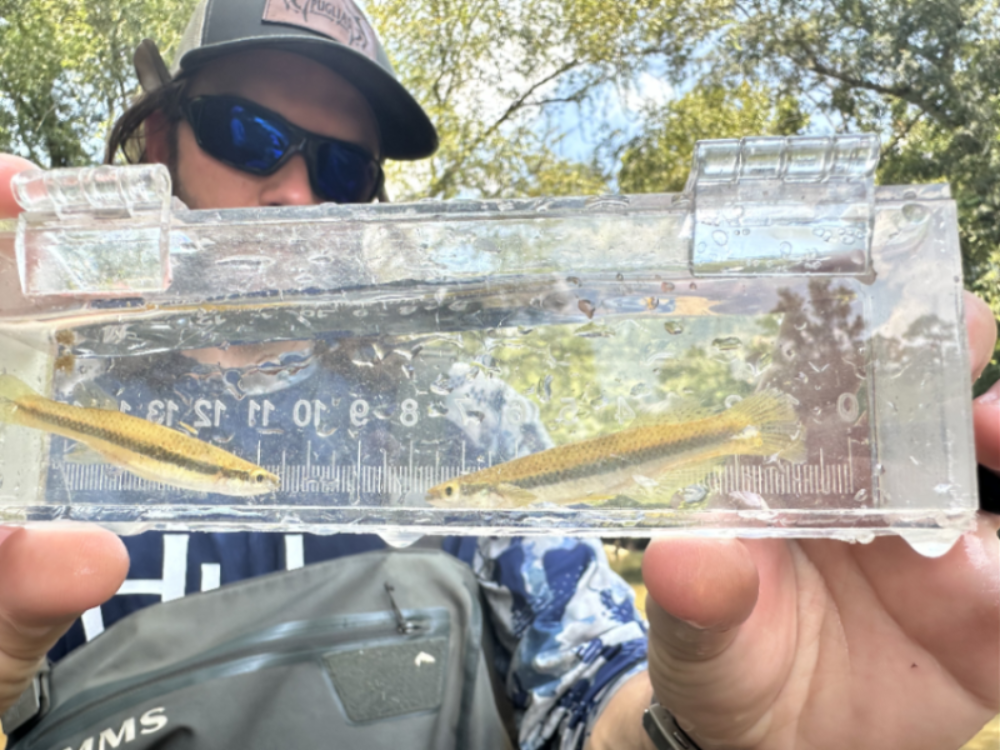Doctorate in Renewable Natural Resources
Overview
The School of Renewable Natural Resources offers a Graduate education to students who wish to discover the natural world and ways to improve the management of renewable resources, protect biodiversity, and promote conservation of diverse ecosystems. Two graduate curricula (Masters and Ph.D.) are available that provide students with advanced education in five areas of concentration: Fisheries and Aquaculture, Forest Products, Forestry and Forest Resources, Watershed Science, or Wildlife. In addition to the degree programs, graduate minors are also available in "Renewable Natural Resources" and "Interdepartmental Studies in Wetland Ecology and Restoration."
Admission to the Pinkie Gordon Lane Graduate School is necessary for entrance into the Graduate Program in the School of Renewable Natural Resources. Information on admissions, applications, fees, tuition, and deadlines is available on the LSU Graduate School website.
Doctor of Philosophy in Renewable Natural Resources
The Ph.D. Degree in Renewable Natural Resources is a new degree in the School of Renewable Natural Resources, which will result from the consolidation of two of the School’s historic Ph.D. degrees (Forestry-PFOR, Wildlife and Fisheries Science-PWFS). The Ph.D. degree in the School of Renewable Natural Resources is a unique degree program that is not offered at any other Louisiana university.
Graduates of the Ph.D. program will pursue science-based careers primarily in academia, but will be qualified to become leaders in industrial organizations, local, state, and federal governments, non-governmental organizations, and consulting firms. Surveys of RNR graduates have shown that job demand is sufficient for successful placement of all graduates as natural resource professionals in Louisiana as well as nationally and internationally.
For the Ph.D in Renewable Natural Resources, five areas of concentration are also available: fisheries and aquaculture, forestry and forest resources, forest products, and wildlife (as for the Masters degree) plus the addition of Watershed Science . The Ph.D. in Renewable Natural Resources is also includes the availability of the Graduate Minor in Interdepartmental Studies in Wetland Ecology and Restoration. Information on all of these choices is available below.
Areas of Concentration
- Fisheries and Aquaculture (FAQP)
- Forestry and Forest Resources (FRSP)
- Forest Products (FPDP)
- Watershed Science (WSCP)
- Wildlife (WLDP)
Graduate Minors
- Fisheries
- Forestry
- Wildlife
- Interdepartmental Studies in Wetland Ecology and Restoration
The minimum course requirement for the Ph.D. in Renewable Natural Resources is 34 semester hours of graduate credit (exclusive of RNR 8000 and RNR 9000) beyond the baccalaureate degree, plus 20 hours of RNR 9000 (dissertation research). Some of the required coursework can be transferred from graduate programs at other universities, subject to approval by the committee.
The following courses or evidence of their equivalence determined by the full advisory committee must be completed for the Ph.D. degree:
| Course | Credit Hours |
Course Title |
| RNR 7001 | 3 | Research Methodology (taken the first available semester) |
| EXST 7004 or 7005 | 4 | Statistical Techniques I |
| EXST 7014 or 7015 | 4 | Statistical Techniques II |
| RNR 7070 (Fisheries) | 1 | Graduate Seminar (2 semesters required) |
| RNR 7071 (Forestry) | 1 | Graduate Seminar (2 semesters required) |
| RNR 7072 (Wildlife) | 1 | Graduate Seminar (2 semesters required) |
Resources for Current Students
All Ph.D. students in their initial semester should meet with their Advisory Committee and plan a program of study, identifying what courses the student will take and the semester to be taken. Completed forms should be provided to the student, all members of the Advisory Committee, and the Administrative Assistant in charge of Student Services in room 227 of the RNR Building. The form should list all courses that will be completed by the student, and any waivers of required courses should be initialed by the Committee Chair. Note that all Ph.D. students are required to take 34 hours of credit, 20 of which will be RNR 9000. No more than 6 hours of RNR 7900 are allowed. Download a blank program of study form.
Current Ph.D. students can find information on graduation requirements, transferring credits and forms on the Graduate School website.
For More Information
William E. Kelso, Ph.D.
Associate Director and Graduate Coordinator
F.O. Bateman Professor of Renewable Natural Resources
School of Renewable Natural Resources
Louisiana State University Agricultural Center
118 RNR Building, Baton Rouge, LA 70803
225-578-4176
[email protected]

LSU COLLEGE OF AGRICULTUREFORMS
Contact
Dr. Allen Rutherford
Director, School Renewable Natural Resources
[email protected]
225-578-4131
Dr. Sabrina Taylor
Coordinator of Graduate Studies and Research
[email protected]
225-578-4131
Dr. Andy Nyman
Coordinator of Interdepartmental Studies in Wetland Ecology and Restoration
phone: 225-578-4220
[email protected]